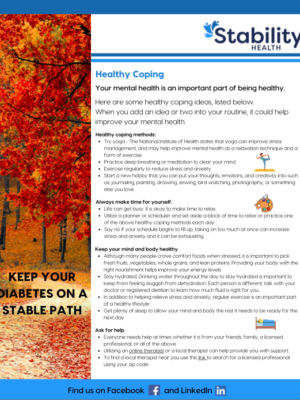
Your mental health is an important part of being healthy.
Here are some healthy coping ideas, listed below. When you add an idea or two into your routine, it could help improve your mental health.
Healthy coping methods:
- Try yoga – The National Institute of Health states that yoga can improve stress management, and may help improve mental health as a relaxation technique and a form of exercise
- Practice deep breathing or meditation to clear your mind
- Exercise regularly to reduce stress and anxiety
- Start a new hobby that you can put your thoughts, emotions, and creativity into such as journaling, painting, drawing, sewing, bird watching, photography, or something else you love
Always make time for yourself.
- Life can get busy. It is okay to make time to relax.
- Utilize a planner or scheduler and set aside a block of time to relax or practice one of the above healthy coping methods each day.
- Say no if your schedule begins to fill up, taking on too much at once can increase stress and anxiety and it can be exhausting.
Keep your mind and body healthy
- Although many people crave comfort foods when stressed, it is important to pick fresh fruits, vegetables, whole grains, and lean proteins. Providing your body with the right nourishment helps improve your energy levels
- Stay hydrated. Drinking water throughout the day to stay hydrated is important to keep from feeling sluggish from dehydration. Each person is different; talk with your doctor or registered dietitian to learn how much fluid is right for you
- In addition to helping relieve stress and anxiety, regular exercise is an important part of a healthy lifestyle
- Get plenty of sleep to allow your mind and body the rest it needs to be ready for the next day
Ask for help
- Everyone needs help at times whether it is from your friends, family, a licensed professional, or all of the above.
- Utilizing an online therapist or a local therapist can help provide you with support.
- To find a local therapist near you use this link to search for a licensed professional using your zip code.
Emergency Preparedness
Natural disasters can happen at anytime. Being prepared by practicing fire drills, keeping extra canned goods in our pantries, and knowing the closest emergency exit route are standard.
Do you have a diabetes emergency preparedness kit?
Why is a diabetes emergency preparedness kit important?
- It ensures you have extra supplies on hand in case you are unable to access a pharmacy or medical care in an emergency.
- It provides those who are informed of the kit and procedures the ability to assist you during high stress situations or situations where you may not be able to do things on your own.
- The kit will provide water and non-perishable foods to help maintain glucose levels in case you do not have access to clean water or food during an emergency.
What should be included in your diabetes emergency preparedness kit?
- Enough water to last about 3 days
- Non-perishable foods that will help maintain blood glucose levels for a few days
- An up-to-date list of medications, dosage amounts, and recent lab work
- A cooler with ice packs that are able to be re-frozen
- Extra blood glucose meter with extra batteries
- Paper and pen/pencil to manually track blood glucose levels as a back up
- Extra medication to hold you over for up to a month if possible
- Juice boxes, glucose tabs, glucose gel, etc. to treat low blood sugar
For more information on what to include in your emergency preparedness kit check out this link for a checklist and more tips!
Coach’s Corner
To call or not to call – that is the question!
Who should be the first call or portal message? Your coach or your diabetes care provider? The answer is it depends on the situation. How critical is the issue? If you need immediate medical attention then you should probably call 9-1-1 or go to the closest urgent care clinic. Not as critical will fall into these categories:
Contact your Coach:
- General questions about healthy eating, meal planning, and carb counting 101
- General questions about exercise and how it can improve your health by lowering BG.
- General questions about your glucose device
Contact your Diabetes Care Provider:
- Blood sugar is spiking for no reason and it has been >300 mg/dL for a couple of hours.
- Frequent overnight lows and/or glucose less than 55 mg/dL AND you take insulin or a sulfonylurea medication.
Do your questions fall into either of these categories? Or are they someplace in the middle? Questions that are nutrition-specific and more detailed than a general overview should be answered by a registered dietitian (RD). Questions about insulin injection techniques should be answered by a certified diabetes care & education specialist (CDCES) – we can help with that! Questions about getting diabetes-ready for special events or intense exercise programs/plans can be answered by a CDCES – we are here for you!
